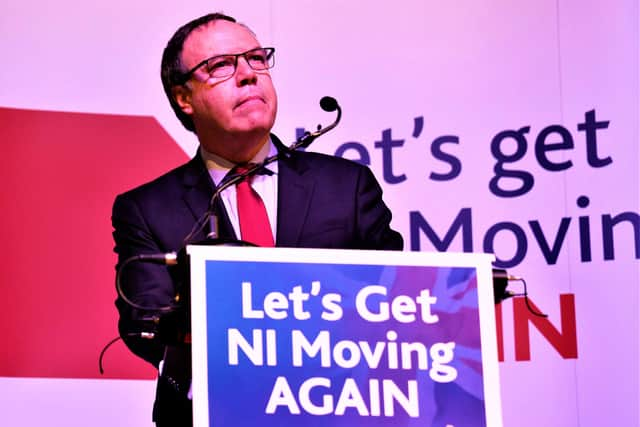Breaking pension pot promise ‘further proof Boris Johnson’s pledges are worthless’ says Nigel Dodds
and live on Freeview channel 276
Lord Dodds made the comments after Boris Johnson told the House of Commons that the long-standing “triple lock” on pensions was being done away with.
The triple lock is basically a government guarantee that state pensions will rise by one of three different measurements: they will either keep pace with inflation, keep pace with general wage rises, or rise by 2.5% – whichever of the three numbers is greater.
Advertisement
Hide AdAdvertisement
Hide AdThe idea behind this mechanism dates back to the mid-2000’s, and was made reality by the Tory-Lib-Dem coalition in 2011.


Keeping it in place also formed part of the DUP-Conservative ‘confidence-and-supply’ agreement of 2017.
Most recently it was part of Boris Johnson’s 2019 manifesto, which said plainly: “We will keep the triple lock.”
Lord Dodds reacted to the news by saying “the fact is that this was a Tory Party manifesto pledge and it should not easily be tossed aside”.
But all his pledges “appear to be worthless”, he added.
Advertisement
Hide AdAdvertisement
Hide AdMr Johnson has said only that the triple lock is suspended for one year, but Lord Dodds said “it’s a dangerous precedent, and the danger is if it happens once it can happen again”.
It all comes against a backdrop of unionist fury at Boris Johnson over his handling of Brexit, and his willingness to accept a de facto border between Great Britain and Northern Ireland.
Lord Dodds said of the triple lock suspension: “The UK has one of the least generous state pension regimes of major countries in the world according to the Organisation for Economic Co-Operation and Development (OECD).
“Pensioner poverty is at the highest level in many years and has been rising steadily since 2012 according to the charity Independent Age.
Advertisement
Hide AdAdvertisement
Hide Ad“Two million people have to get by on a state pension of less than £100 per week, mainly women, according to Hargreaves Lansdown. “The fact is that this was a Tory Party manifesto pledge and it should not easily be tossed aside like other pledges which all appear to be worthless.”
“The pandemic has led to particularly difficult circumstances for older people, and fuel price increases will lead to greater fuel poverty amongst older people.
“Household costs have risen faster for pensioners than for the working population, according to the Office for National Statistics.
“If it were scrapped completely, low paid younger people would have to save double the amount to avoid poverty in old age.
Advertisement
Hide AdAdvertisement
Hide Ad“Most pensioners have paid into the system for 40-50 years. Whilst the government say [the triple-lock waiver] is temporary, there is absolutely no guarantee given as to the future.”
As far back as June, the Financial Times was reporting that chancellor Rishi Sunak “will have to spend up to £4bn more on pensioners from next year if he sticks to the Conservative party’s ‘triple lock’ pledge”.
Announcing the measure in the Commons, he insisted it was necessary to deal with the backlog in the NHS built up during Covid and to deliver long-overdue reform of the social care system in England.
And at a press conference later in Downing Street, he refused to give a firm commitment that taxes would not go up again – although he said he did not want that to happen.
Advertisement
Hide AdAdvertisement
Hide Ad“If you want me to give that emotional commitment, of course that’s the case,” he said.
Mr Johnson broke another manifesto pledge yesterday too – that National Insurance contributions would not rise.
The Government’s plan will see the introduction of a new health and social care levy, based on a 1.25 percentage-point increase in National Insurance contributions.
Under the new levy a typical basic-rate taxpayer earning £24,100 would pay £180 more a year, while a higher-rate taxpayer on £67,100 would pay £715.
More from this reporter:
Advertisement
Hide AdAdvertisement
Hide Ad> Click here: South Armagh fiasco: Survey group led by ex-IRA killer Harry Maguire is funded almost totally by taxpayers
> Click here: Omagh inquiry call: ‘True blame must stay on terrorists’
Advertisement
Hide AdAdvertisement
Hide Ad> Click here: Ex-confidential files from 1993 show state feared ‘trip and fall’ compensation would fund IRA
> Click here: House price boom: home working and lockdown are helping to heat up NI’s property market
A message from the Editor:
Thank you for reading this story on our website. While I have your attention, I also have an important request to make of you.
Advertisement
Hide AdAdvertisement
Hide AdWith the coronavirus lockdown having a major impact on many of our advertisers — and consequently the revenue we receive — we are more reliant than ever on you taking out a digital subscription.
Subscribe to newsletter.co.uk and enjoy unlimited access to the best Northern Ireland and UK news and information online and on our app. With a digital subscription, you can read more than 5 articles, see fewer ads, enjoy faster load times, and get access to exclusive newsletters and content. Visit www.newsletter.co.uk/subscriptions now to sign up.
Our journalism costs money and we rely on advertising, print and digital revenues to help to support them. By supporting us, we are able to support you in providing trusted, fact-checked content for this website.